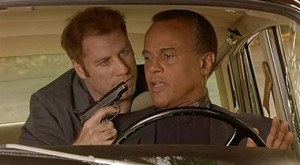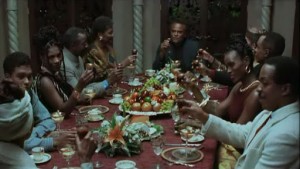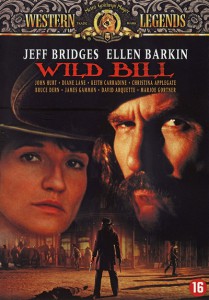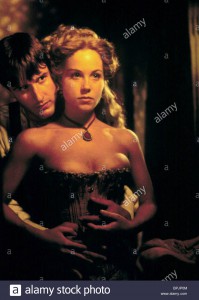This remake of Billy Wilder’s weak 50s romantic comedy minimizes the jaded, dirty-old-man aspect of the sub-Lubitsch original (a flaw it shares with Wilder’s Love in the Afternoon) with better casting. Humphrey Bogart certainly had his gifts, but Harrison Ford makes a better romantic lead as a tycoon opposite a gamine chauffeur’s daughter; and if Julia Ormond initially seems to be playing Audrey Hepburn rather than Sabrina, she eventually takes over the part for herself. Sydney Pollack directs with the sort of polish that was easy to take for granted two decades ago but almost looked like classicism in 1995. With Greg Kinnear (in the William Holden part), Nancy Marchand, and John Wood, in a script by Barbara Benedek and David Rayfiel. This is basically Hollywood nonsense with all the usual dishonesty, but it goes down easily. PG, 127 min. (JR) Read more
Some of the most exhilarating camera movements and most luscious black-and-white cinematography you’ll ever see inhabit this singular, delirious 141-minute communist propaganda epic of 1964, a Cuban-Russian production poorly received in both countries at the time (in Cuba it was often referred to as I Am Not Cuba). Directed by Mikhail Kalatozovbest known in the West for his 1957 The Cranes Are Flyingfrom a screenplay by Yevgeny Yevtushenko and Enrique Pineda Barnet, this multipart hymn to the Cuban communist revolution may be dated to the point of campiness in much of its rhetoric, but it stands alongside the unfinished masterworks of Sergei Eisenstein and Orson Welles about Latin America, Que Viva Mexico and It’s All True, two parallel celebrations from foreign perspectives. (The constructivist shack occupied by a Havana prostitute in the first episode is one example of stylization run amok here.) In Spanish and Russian with subtitles. 141 min. (JR) Read more
Jeff Bridges stars as Wild Bill Hickok in an ambitious and flavorsome picture by writer-director Walter Hill–based on Thomas Babe’s play Fathers and Sons and Peter Dexter’s novel Deadwood–that’s not only a western but also a western saga and an art picture of sorts. Very striking to look at it in terms of Joseph Nemec III’s production design and Lloyd Ahern’s cinematography (with varying uses of black and white as well as color), the film ultimately comes up short when it has to deal with Hickok as something other than a legend; Hill is hampered as usual by his fixation on iconography over everything else. Ellen Barkin seems a bit uncomfortable with her underwritten part as Calamity Jane, but the remainder of the cast–including John Hurt, Diane Lane, David Arquette, Christina Applegate, Bruce Dern, James Gammon, and Marjoe Gortner–does a pretty good job of playing scenery, and Keith Carradine turns in a nice bit as Buffalo Bill. You may feel a little let down by the end of this movie because it hasn’t managed to marshal all its virtues, but there’s plenty of grit and atmosphere along the way. Water Tower. Read more
A veritable film festival of macho self-pity from actor-turned-writer/director Sean Penn, adapting a novel by David Rabe. One tender-tough alcoholic blowhard (Jack Nicholson at his most insufferable, allowed to cry at regular intervals for Oscar consideration), a divorced jewelry store owner who hangs out in strip joints like a Cassavetes hero, is determined to kill the hit-and-run driver who killed his daughter years before and is now emerging from prison. (David Morse, who plays the driver, gives a relatively sharp and understated performancefor me the only bearable thing in the movie). Wallowing in pretension, the movie even tries pornographically to milk our awareness of Nicholson and Angelica Huston’s old relationship when their characters converse as a former couple. With Robin Wright and Piper Laurie. (JR) Read more
From the Chicago Reader (November 28, 1995). — J.R.

This starts off as a dopey (if well-intentioned) racial allegory and then gets somewhat better, simply because its casting winds up saying more than its script. In a universe where white people are treated like black people and vice versa, a loyal factory worker (John Travolta) gets laid off by his wealthy, racist employer (Harry Belafonte); after struggling to regain his footing, the former worker winds up kidnapping his former boss. The best that can be said for writer-director Desmond Nakano’s rather abstract premise is that it becomes playable only after the viewer is persuaded to overlook it, and only because the class differences of Travolta and Belafonte wind up registering more strongly than their racial differences do. Produced by Lawrence Bender — who brought us Reservoir Dogs and Pulp Fiction, two other movies preoccupied with race that are equally unwilling to handle the subject directly — this settles down to being a watchable oddity that doesn’t really take off; with Kelly Lynch, Margaret Avery, and Tom Bower. (JR)
 Read more
Read more
From the Chicago Reader (November 27, 1995). Twilight Time is bringing this out on Blu-Ray. — J.R.

Jeff Bridges stars as Wild Bill Hickok in this ambitious and flavorsome picture (1995) by Walter Hill. Based on Thomas Babe’s play Fathers and Sons and Peter Dexter’s novel Deadwood, it’s not only a western but also an art picture of sorts, with striking production design by Joseph Nemec III and cinematography by Lloyd Ahern (with varying uses of black and white as well as color). The film ultimately comes up short when it has to deal with Hickok as something other than a legend; Hill is hampered as usual by his fixation on iconography. Ellen Barkin seems uncomfortable as Calamity Jane, but the remainder of the cast — John Hurt, Diane Lane, David Arquette, Christina Applegate, Keith Carradine, Bruce Dern, James Gammon, and Marjoe Gortner — does a pretty good job of playing scenery. You may feel a little let down by the end, but there’s plenty of grit and atmosphere along the way. 97 min. (JR)
 Read more
Read more
Unfolding in real time, from the moment a CPA (Johnny Depp) arrives at Los Angeles’s Union Station with his little girl to the moment 90 minutes or so later when a political assassination is supposed to occur in the Westin Bonaventure Hotel a few blocks away (the same hotel, if memory serves, that provided the climax for In the Line of Fire), this crackerjack paranoid thriller is a skillful example of what Hollywood used to do so well in the 40s and 50s, in sleepers like The Window and Don’t Bother to Knock. Working with a script by Patrick Sheane Duncan and Ebbe Roe Smith, producer-director John Badham, in his best film since Saturday Night Fever, does an able job of moving around his actors (including Christopher Walken, Charles S. Dutton, Peter Strauss, Roma Maffia, Gloria Reuben, and Marsha Mason). Despite a few lapses in judgment, this is a well-crafted exercise–and one, incidentally, that packs a pointed if unobtrusive punch about how both gubernatorial campaigns and fancy hotels are run. For my money, this is more fun than Speed–it keeps you in suspense without insulting your intelligence. Depp makes a likably offbeat action hero. Ford City, Webster Place, Bricktown Square, Golf Glen, Gardens, North Riverside, Burnham Plaza, McClurg Court, Lincoln Village. Read more
What a novel idea for a movie: a black transit cop (Wesley Snipes) and a white transit cop (Woody Harrelson), foster brothers in love with the same woman (Jennifer Lopez), team up to rob a New York subway train carrying millions of dollars in receipts after their mean old boss (Robert Blake) fires them both. If you think you’ve already seen some version of this you’re right, though probably nothing so dumb or insulting to the viewer’s intelligence. Joseph Ruben (The Stepfather, Sleeping With the Enemy) directed a script by Doug Richardson and David Loughery; Chris Cooper costars. (JR) Read more
Chic lesbian porn (and one fairly hot heterosexual session). A repressed woman engaged to a minister meets a female circus performer in a laundromat, and the two women set about exploring each other’s sensuality. Canadian writer-director Patricia Rozema (I’ve Heard the Mermaids Singing) is an admirer of Bergman and Woody Allen, and like them she has a penchant for creating arty surfaces that pass for thought; this 1995 movie looks fine as long as you don’t think too much about it. With Pascale Bussieres, Henry Czerny, Rachael Crawford, David Fox, Don McKellar, and Tracy Wright. R, 96 min. (JR) Read more
The first film directed by playwright Christopher Hampton, who’s working from his own scriptan adaptation of Michael Holroyd’s book Lytton Strachey. This is an engaging and absorbing look at experimental bohemian lifestyles, specifically those of gay English writer Strachey (Jonathan Pryce) and straight English painter Dora Carrington (Emma Thompson), who lived together between World War I and the early 30s. Obviously influenced (albeit in a subdued English way) by Jules and Jim, this has been criticized for its historical inaccuracies, and one should certainly object to the deletion by the American distributor, Gramercy Pictures, of six minutes of the original film (apparently much of it gay sex) on the safe assumption that most Americans, including most critics, won’t care enough to object. But if you aren’t expecting a masterpiece or a piece of precise historiography, you probably will be held by the story, as well as by Pryce’s performance. With Steven Waddington, Rufus Sewall, Samuel West, and Penelope Wilton. (JR) Read more
This 48-minute video was made by Jean-Luc Godard and Anne-Marie Mieville for English television in 1985. It shows Godard and Mieville at their home in rural Switzerland and in many ways is the most intimate and domestic of Godard’s works, one that also broaches the question of what distinguishes film from video; it can be viewed in retrospect as a necessary prelude to his Histoire(s) du cinema, a video series that’s still in progress. A Chicago premiere. Facets Multimedia Center, 1517 W. Fullerton, Friday and Saturday, November 10 and 11, 7:00 and 9:00, and Sunday, November 12, 5:30 and 7:30, 281-4114. Read more
John F. Kennedy’s favorite role model is back saucier than ever (Pierce Brosnan) in the era of computer hackers (1995). There’s something a mite pathetic about our culture still clinging to 007, but it’s hard to deny that this is one of the most entertaining entries in the Bond cycle, which started with Dr. No (1962). One thing in this romp’s favor is its awareness of the absurdity of Bond in the 90s, which it comments on from time to time; another is that it’s pretty well crafted, beginning with the spectacular opening stunt work (or morphing) and the surrealist credits sequence that follows. Kinky and inconsequential, this is effective entertainment. Martin Campbell directed; with Sean Bean, Izabella Scorupco, Famke Janssen, Joe Don Baker, Robbie Coltrane, and Judi Dench. PG-13, 130 min. (JR) Read more
Michael Douglas plays the president of the United States, who has dating problems (1995). A comedy directed by Rob Reiner from a script by Aaron Sorkin, who also scripted Reiner’s A Few Good Men; this time the laughs are intentional. Working some of the same territory as 1993’s Dave, with an obvious desire to emulate Cukor’s Tracy and Hepburn comedies as well (as signaled in one flash clip), this is a pleasant, inoffensive, and (quite properly) mindless diversion. With Annette Bening as the dating interest, Martin Sheen, Michael J. Fox, Anna Deavere Smith, Samantha Mathis, and Richard Dreyfuss (1995). (JR) Read more
In keeping with the prevailing designer-vomit Hollywood style of glamorous despair, Mike Figgis adapts a novel by the late John O’Brien about the impromptu romance in Las Vegas between a former Hollywood executive drinking himself to death (Nicolas Cage) and a hooker (Elisabeth Shue) who loses her pimp (Julian Sands, playing a Latvian). Like so much else, this 1995 movie prides itself in being terminal in its view of human failure, is shot like a perfume commercial, and is accompanied by a dreamy set of golden-oldie standards. Needless to say, the plot goes nowhere, but under the pornographic circumstances Figgis, Cage, and Shue all do fine jobs. (JR) Read more
Superficially, this first feature by 25-year-old writer-director Noah Baumbach (1995) — a comedy about four male college graduates who find themselves unable to leave campus and start their lives — calls to mind Bodies, Rest & Motion and Reality Bites (both of which shared this movie’s producer, Joel Castleberg) as well as the two brittle and literate features of Whit Stillman, Metropolitan and Barcelona (both sharing actor Chris Eigeman). But part of what makes this effort more soulful and sustaining than any of those reference points is the curiosity and alertness of Baumbach’s direction of his actorsEigeman, Josh Hamilton, Jason Wiles, Carlos Jacott, Eric Stoltz, Olivia d’Abo, Elliott Gould, Cara Buono, and Parker Posey. There’s plenty of wit on the surface, but the pain of paralysis comes through loud and clear. Check this one out. (JR) Read more




